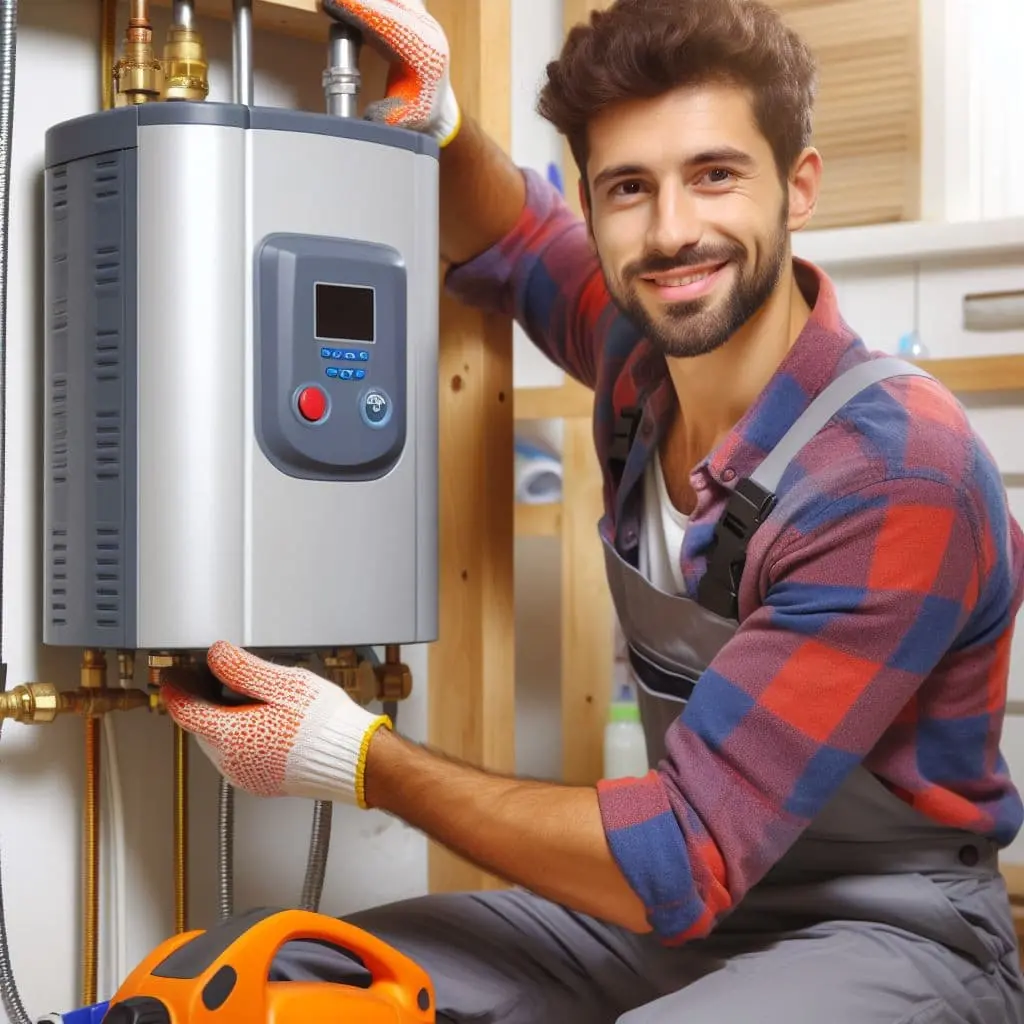
Tank vs. Tankless Water Heaters: A Breakdown for Lakewood Homeowners
- Quality Products: Pick a unit that will accomplish your goal. If it's hot on demand make sure your unit supports a recirculating pump.
- Personalized Service: Have someone that can provide personal service and recommend equipment and parts based on your situation.
- Supporting Your Community: Involve a company that is local to you, that later on when you have to maintain your unit it's by someone that knows your equipment.
- Potential for Better Pricing: Ask about rebates or discounts that may apply to your situation.
- Warranties & Support: Last but not least, find out about warranties and support down the road.
Embark on a journey to explore the exceptional benefits of tankless water heaters, celebrated for their energy efficiency and cost-effectiveness. These modern heating systems offer a multitude of advantages over traditional water heaters, promising enhanced value for your home or business. Join us as we delve into a comprehensive cost comparison to highlight the superior advantages that tankless water heaters can provide.
Water Heater Tanks
Upfront Cost: Traditional storage tank water heaters are generally cheaper to
purchase upfront.
Traditional Tank: $300 - $3,000
Expansion Tank: $100 - $300
Hoses and Fittings: $20 - $75
Lifespan: 10-15 years
Energy Efficiency: Less efficient as they continuously heat water in the tank, even
when not in use.
Installation: $50 to $300 per hour (labor costs will vary)
Pros: Replacing an old water heater with the same type of tank water heater is less expensive upfront, easier to install, doesn't require many modifications to your home, such as venting in the roof or electrical additions. Overall a quicker install as compared to other types of water heaters.
Cons: Traditional water heaters are less energy efficient, have a shorter lifespan, and take up more space. They also require more maintenance and have a higher risk of leaks and flooding, due to corrosion and rusting.
Tankless Water Heaters
Upfront Cost: Tankless water heaters are generally more expensive to purchase
upfront.
Gas Tankless: $1,000 - $3,000
Electric Tankless: $500 - $1,000
Lifespan: 20+ years
Energy Efficiency: More efficient as they only heat water when needed.
Installation: $100 to $300 per hour (labor costs will vary)
Pros: Tankless water heaters are more energy efficient, have a longer lifespan,
take up less space, and require less maintenance.
They also have a lower risk of leaks and flooding due to the absence of a tank. Tankless water
heaters are also more versatile as they can be adapted
with a recirculation pump to provide instant hot water to any fixture in the home and can be
installed in a variety of locations, such as closets or
even outside the home.
As a side note: Tankless water heaters are also eligible for a federal tax credit
of up to $300, which can help offset the initial cost.
A recent study by the U.S. Department of Energy found that tankless water heaters
can be up to 34% more energy efficient than traditional tank water heaters.
Another study by the Consumer Energy Center found that tankless water heaters can
be up to 50% more energy efficient than traditional tank water heaters.
Yet another study by Zillow found that homes with tankless water heaters sell for
4% more than homes with traditional tank water heaters.
Cons: Replacing an old water heater with a tankless water heater is more expensive upfront, and may require modifications to your home, such as venting in the roof or electrical additions. Overall a longer install as compared to other types of water heaters.
Space-Saving and Longevity: Why Tankless Water Heaters Are a Smart Investment
Tankless water heaters are revolutionizing the way we heat water in our homes. They offer a space-saving solution and provide longevity that traditional water heaters can't match. Investing in a tankless water heater is a smart choice for those looking to save space, reduce energy costs, and enjoy hot water on demand, provided the model you choose supports a recirculation pump or is equipped with one.
If each of us spent $100 a year more on local businesses instead of chain stores, it would put an extra $3 million a year into our economy, not only that but it would create thousands more jobs.
Performance and Convenience: The Superiority of Tankless Water Heaters
Tankless water heaters are revolutionizing the way we experience hot water in our homes. Offering unparalleled performance and convenience, these innovative systems provide hot water on demand without the limitations of traditional storage tank models. With their energy-efficient design, space-saving footprint, and ability to deliver a continuous supply of hot water, tankless water heaters have emerged as the superior choice for modern households seeking reliable and efficient solutions for their hot water needs.
As mentioned in other sections, for on-demand hot water, a recirculation pump is required. Some higher-end tankless water heaters have them built-in or have the ability to support one being added. If this is a feature you are interested in, be sure to ask your local plumbing professional about it.
For a short video on how a tankless works by Rinnai Click Here!

Maintenance and Installation Considerations:
When it comes to maintenance and installation, tankless water heaters offer distinct advantages over traditional storage tank models. Their streamlined design and efficient operation make them easier to maintain and install, providing homeowners with a hassle-free experience and peace of mind.
Maintenance time requirements will vary depending on the amount of use and the quality of the water, but periodic descaling is required. Generally speaking, this is a job for a local qualified plumber to determine how often, and as chemicals are used to descale the unit, this is another reason for a specialist to get involved and discuss your options.
If you're planning to relocate your water heater, be sure to consult with a professional plumber to ensure the location is prepared in advance and any local permits are addressed. Your venting system is another consideration as tankless systems generally require a larger vent. ensure your plumbing is located in a serviceable location and in acceptable condition and is easily accessible, and electrical requirements are met.
Another note to consider is that tankless water heaters require a minimum flow rate to activate the heating element. If you have a low flow rate, you may need to install a recirculation pump to ensure the water heater activates when you need it to.
Installation Expertise
The installation process of a tankless water heater requires specialized skill and knowledge. Local plumbing companies employ trained and experienced professionals who are well-versed in the intricacies of tankless water heater installation. They have the expertise to handle any challenges that may arise during installation, such as gas line connections or electrical considerations. This ensures that the tankless water heater is installed correctly the first time, maximizing its performance and efficiency.
By purchasing from local businesses, you are, as Anna Lappe so poignantly says, “casting a vote for the kind of world you want”
Follow-up Services and Maintenance
Local plumbing companies offer comprehensive follow-up services and maintenance for tankless water heaters. They provide regular maintenance checks, repairs, and replacements to ensure that the tankless water heater continues to operate at peak performance. This level of support and expertise is invaluable for homeowners, as it ensures that their investment in a tankless water heater is protected and maintained for years to come.
Conclusion
When making decisions for your home, it is crucial to weigh the pros and cons carefully. By considering factors such as cost, durability, aesthetics, and maintenance requirements, you can make an informed decision that aligns with your needs and preferences. While each option may have its advantages and drawbacks, taking the time to evaluate them will help you choose the best fit for your home. Remember to prioritize what matters most to you and seek expert advice when needed. Ultimately, a well-informed decision will not only enhance the functionality and appeal of your living space but also contribute to your overall satisfaction and comfort in the long run.